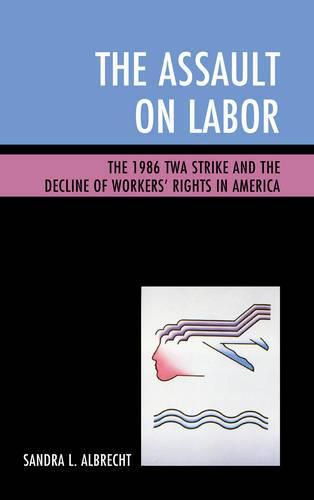Readings Newsletter
Become a Readings Member to make your shopping experience even easier.
Sign in or sign up for free!
You’re not far away from qualifying for FREE standard shipping within Australia
You’ve qualified for FREE standard shipping within Australia
The cart is loading…






The Assault on Labor details the 1986 Independent Federation of Flight Attendants (IFFA) strike against Trans World Airlines (TWA), one of the most dramatic instances of the heightened labor conflict in the 1980s. Using extensive court, union, and company documents, The Assault on Labor shows how the expanded use of permanent replacements in labor disputes has fundamentally altered workers’ legal right to strike. Set within one of the biggest corporate raids of the time, it was a strike of a predominantly female labor force that garnered respect throughout the labor movement for its solidarity and determination. Faced with the permanent replacement of over 5000 strikers, IFFA waged a three year struggle to return all workers to the line, mobilizing political, economic, and legal actions to secure their jobs and survive as a union. Despite critical successes in the courts in the aftermath of the strike, the Supreme Court would render a decision that further strengthened permanent replacements. Since the 1980s, labor’s major form of protest, the right to strike, has all but disappeared.
$9.00 standard shipping within Australia
FREE standard shipping within Australia for orders over $100.00
Express & International shipping calculated at checkout
The Assault on Labor details the 1986 Independent Federation of Flight Attendants (IFFA) strike against Trans World Airlines (TWA), one of the most dramatic instances of the heightened labor conflict in the 1980s. Using extensive court, union, and company documents, The Assault on Labor shows how the expanded use of permanent replacements in labor disputes has fundamentally altered workers’ legal right to strike. Set within one of the biggest corporate raids of the time, it was a strike of a predominantly female labor force that garnered respect throughout the labor movement for its solidarity and determination. Faced with the permanent replacement of over 5000 strikers, IFFA waged a three year struggle to return all workers to the line, mobilizing political, economic, and legal actions to secure their jobs and survive as a union. Despite critical successes in the courts in the aftermath of the strike, the Supreme Court would render a decision that further strengthened permanent replacements. Since the 1980s, labor’s major form of protest, the right to strike, has all but disappeared.